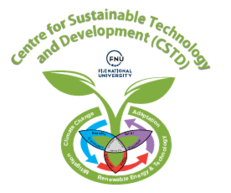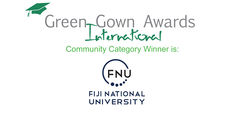International Green Gown Award Winner
Centre for Sustainable Technology and Development (CSTD)
Our climate-smart landscapes: watershed protection using agroforestry systems and soil conservation to enhance community resilience to climate change in six upper watershed communities in Ba (Viti Levu) Fiji Islands
Community engagement and climate change adaptation (CCA) can be made simple and effective, by implementing Fijian traditional agroforestry systems (TAFS), community-empowerment, training and capacity-building and replicating of local initiatives.
This creates ownership for long-term sustainability, while protecting vulnerable watersheds from hillside erosion.
Project funders were GEF-SGP and ACP-EU-FORENET. Work started by USP-PACE-SD (in 2010/11), then transferred to CSTD-FNU (2013/14) for necessary follow-up with the Fijian Forestry Department and local Planting Committees/Contracts.
Top 3 learnings
1. Community Based Adaptation (CBA) works if communities themselves take ownership.
2. Publishing of technical reports and disseminating lessons-learned.
3. Collaboration and well-planned coordination is needed to undertake any CB Adaptation project.
What it means to win
“We (as CSTD) and as part of FNU, are very honoured to receive this Green Gown Award, as this would propel CSTD and FNU towards quality international recognition, involving ourselves as well in further climate change community based activities and provide an opportunity to demonstrate to others that resilience can be achieved through simple practical measures that don’t require large external funding. Sustainability is derived from bottom-up practical means of adaptation; thus creating shared interest and mutual interconnectedness, emphasizing traditional knowledge, and strengthening institutional research and development endeavours in Small Island Developing States (SIDS).”
Prof Nigel Healey Vice-Chancellor/Principal
Videos










 Except where otherwise stated, content on this site is
licensed under a Creative Commons Attribution 3.0 License.
Except where otherwise stated, content on this site is
licensed under a Creative Commons Attribution 3.0 License.
